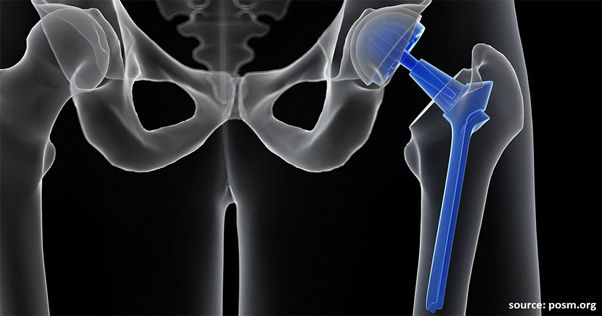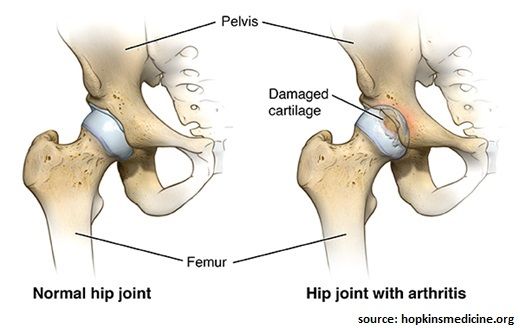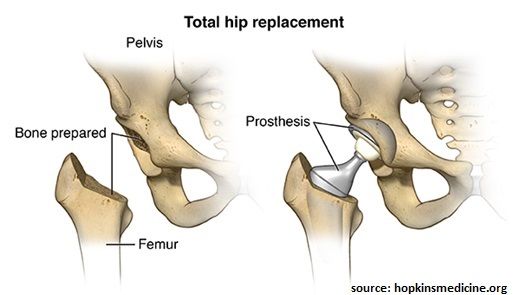The hip is one of the body’s largest joints. It is a ball-and-socket joint. The socket is formed by the acetabulum, which is part of the pelvis bone. The ball is the femoral head, which is the upper end of the femur. Hip replacement surgery is one of the most successful operations in all of medicine.
Many people in Bhubaneswar are opting for hip replacement surgery. Are you planning on going for this surgery as well?
If so, you are in the right place. In this article, we have discussed everything you need to know about hip replacement surgery. Let us begin with what a hip replacement is?
What is hip replacement surgery?

Hip replacement (complete hip arthroplasty) is a procedure to replace a damaged hip or worn-out joint. Your orthopedic doctor in Bhubaneswar replaces the existing joint with an artificial joint (prosthesis).
This procedure may be an option following a hip fracture or for severe pain due to arthritis.
Different forms of arthritis may affect the hip joint:
- Osteoarthritis : A degenerative joint disease that influences mainly middle-aged and older adults. It may cause joint cartilage and hip’s adjacent bone breakdown.
- Rheumatoid arthritis : This arthritis type cause inflammation in the joint’s synovial lining. It produces excess synovial fluid. It may bring severe pain and stiffness.
- Traumatic arthritis : An injury causes this arthritis. It damages the hip cartilage.
The hip replacement procedure’s goal is to replace the hip joint parts that are damaged. It relieves hip pain that other treatments cannot control.
Why do I need hip replacement surgery?

Osteoarthritis causes joint cartilage loss within the hip. Cartilage and bone damage restricts movement and may raise pain. People having severe pain from a degenerative joint disease may not do activities that include hip bending. These activities involve sitting and walking.
Arthritis forms like rheumatoid arthritis and hip injury arthritis can also affect the hip joint. Hip replacement may also be utilized to treat some hip fractures. A fall often causes fracture injury. Fracture’s pain is severe. Walking or even leg movement causes pain.
If other medical procedures do not regulate your arthritis pain, your doctor may suggest a hip replacement.
Now that you know why you might need a hip replacement surgery let us discuss how it happens.
What happens during hip replacement surgery?

Hip replacement often requires a hospital stay. Treatments may differ based on your condition and your doctor’s practices.
Hip replacement is performed while you are asleep sedated under spinal anaesthesia or general anaesthesia. Your orthopaedist in Bhubaneswar will discuss this with you before the procedure.
Usually, hip replacement includes this process
- You are asked to remove clothing and are provided with a gown to wear.
- An IV (intravenous) line may be initiated in your hand or arm.
- You are positioned over the operating table.
- A urinary catheter may be placed after you are asleep.
- The doctor watches your heart rate, breathing, blood pressure, and blood oxygen level at the procedure.
- The skin on the surgical place is cleaned using an antiseptic solution.
- The specialist makes an incision in the hip area.
- The specialist replaces the hip joint’s damaged parts with the prosthesis. The hip prosthesis is made of a stem that enters within the thighbone (femur), the head joint (ball) that fits with the stem, and a cup placed within the hip joint’s socket.
- The stem and cup are metal made. The ball may be metal, or ceramic made. The cup contains a liner that may be plastic, or ceramic made.
- The two most general artificial hip prostheses forms used are cemented prostheses and uncemented prostheses. A cemented prosthesis fixes to the bone using surgical cement.
- An uncemented prosthesis fixes the bone using a porous surface. The bone develops over this surface to fix the prosthesis. Sometimes a mixture of the two types is utilized to replace a hip.
- The incision is closed using surgical staples or stitches.
- A drain may be inserted within the incision site to extract the fluid.
- A sterile bandage or dressing is applied over the site.
Once your surgery is complete, you can go home after a few days. However, you must contact your ortho doctor in Bhubaneswar if you suffer from any of the following conditions:
- Hip pain worsens
- Swelling or pain in your leg or calf not associated with your incision
- Redness or tenderness in your calf
- 100.4°F (38°C) fever or higher, or as your doctor directed
- Shaking chills
- Redness or swelling at the incision site worsens
- Fluid draining from the incision
- You may return to your regular diet unless your doctor tells you differently. Avoid driving until your specialist tells you to. You may have to reduce other activities as well. Complete recovery from the procedure may take many months.
- Hip replacements usually have high success rates. It is often called one of the successful procedures in all of medicine. Several people who go for the surgery report significantly reduced hip pain and better able to do regular activities.
Hip joints last several years; however, obesity or high-impact activity may reduce their lifespan. Few people need to have a second hip replacement if the initial one starts to deteriorate. They have newer materials and designs, which can last for many decades.
If you want to learn whether a hip replacement is the right procedure for your condition, then book an appointment with our orthopaedic doctor in Bhubaneswar.
